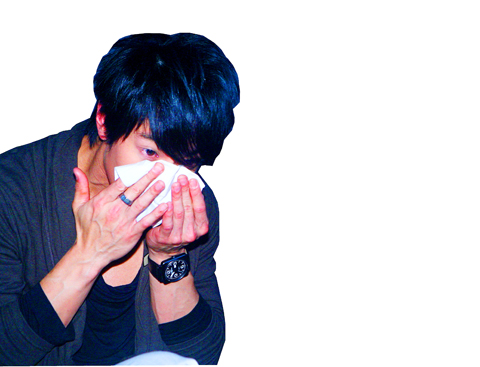Local media have dubbed four-piece boy band Fahrenheit (飛輪海) the new F4 after it proved adept at raking in foreign currency from neighboring Asian countries. Reporters calculated that the group’s newly launched Web site (www.fahrenciti.com) successfully netted roughly 3,000 paid memberships in its first five days. Around 500 fans flew in from Japan, Hong Kong, South Korea and Singapore to meet their idols in person at the site’s launch party held at Nangang Sports Center (南港運動中心) last weekend.
Fahrenheit’s band members, who are also known by their temperatures (“cold, cool, warm and hot”), did their part and turned in emotional performances to ensure the get-together was worth the flight. Reportedly moved by the band’s success, Wu Chun (吳尊, 59°F), the sappy one, took the initiative and turned the celebration into a tearjerker by sobbing uncontrollably. Wu’s fellow crooners followed suit, finally reaching a climax that involved a group hug and four blubbering pretty boys.
Having had a taste of sudden media attention following her arrest for smoking marijuana, starlet Pei Lin (裴琳) has found a new way of commanding column inches after being discharged from the jug. The vernacular press is salivating over Pei’s alleged lesbian relationship with makeup artist’s assistant Lo Ya–wen (羅雅文), who was caught smoking pot with the star during a police raid last year.

PHOTO: TAIPEI TIMES
Next probed Pei’s queerness by investigating how she spent her time in jail, and uncovered salacious details of the young star slurping up freshly squeezed orange juice and chomping on sticky rice desserts handmade by admirers. Pop Stop is outraged.
Pei denied all the above but said she would have batted for her own team if she had stayed at the women’s prison any longer.
Former beauty pageant winner Yuni Li (李妍瑾) returned to the media’s attention not for her famed “chocolate nipples,” but her budding amour with a guitar player known as Hantan Yeh (寒單爺). Li broke up with Shin (信), of Shin Band (信樂團) last year.

PHOTO: TAIPEI TIMES
Members of the press pack wondered whether Li has a predilection for broke rockers. The Liberty Times (the Taipei Times’ sister paper) unleashed its intrepid showbiz reporters on the story, who revealed that the guitarist comes from a well-heeled family and that playing in an underground band is just one of his pastimes.
Li brushed off reports that the rocker spent more than NT$10 million winning her heart and insisted that the strummer is just a typical angry musician who runs amok at bars.
Much to the delight of the Hong Kong paparazzi tailing pop idol Nicholas Tse (謝霆鋒), who is shooting the sequel of Storm Riders (風雲) in Bangkok, Cecilia Cheung (張柏芝) made a surprise visit to the set last week, along with the couple’s baby boy and a troupe of assistants.
After the Edison Chen (陳冠希) sex-photo scandal, the disgraced actress and wife has allegedly resolved on following extreme methods to save her marriage with Tse. From reportedly begging for forgiveness, making suicide threats to attempting to get pregnant again, Cheung is said to be sticking close to her husband and deploying every trick in the book.
According to Liberty Times and Next, Tse was indeed surprised by Cheung’s unannounced visit, though not necessarily in a pleasant way. Photos from the scene show a sullen Tse sitting next to Cheung and their baby in a car.

As I finally slid into the warm embrace of the hot, clifftop pool, it was a serene moment of reflection. The sound of the river reflected off the cave walls, the white of our camping lights reflected off the dark, shimmering surface of the water, and I reflected on how fortunate I was to be here. After all, the beautiful walk through narrow canyons that had brought us here had been inaccessible for five years — and will be again soon. The day had started at the Huisun Forest Area (惠蓀林場), at the end of Nantou County Route 80, north and east

Specialty sandwiches loaded with the contents of an entire charcuterie board, overflowing with sauces, creams and all manner of creative add-ons, is perhaps one of the biggest global food trends of this year. From London to New York, lines form down the block for mortadella, burrata, pistachio and more stuffed between slices of fresh sourdough, rye or focaccia. To try the trend in Taipei, Munchies Mafia is for sure the spot — could this be the best sandwich in town? Carlos from Spain and Sergio from Mexico opened this spot just seven months ago. The two met working in the

Exceptions to the rule are sometimes revealing. For a brief few years, there was an emerging ideological split between the Democratic Progressive Party (DPP) and Chinese Nationalist Party (KMT) that appeared to be pushing the DPP in a direction that would be considered more liberal, and the KMT more conservative. In the previous column, “The KMT-DPP’s bureaucrat-led developmental state” (Dec. 11, page 12), we examined how Taiwan’s democratic system developed, and how both the two main parties largely accepted a similar consensus on how Taiwan should be run domestically and did not split along the left-right lines more familiar in

This month the government ordered a one-year block of Xiaohongshu (小紅書) or Rednote, a Chinese social media platform with more than 3 million users in Taiwan. The government pointed to widespread fraud activity on the platform, along with cybersecurity failures. Officials said that they had reached out to the company and asked it to change. However, they received no response. The pro-China parties, the Chinese Nationalist Party (KMT) and Taiwan People’s Party (TPP), immediately swung into action, denouncing the ban as an attack on free speech. This “free speech” claim was then echoed by the People’s Republic of China (PRC),